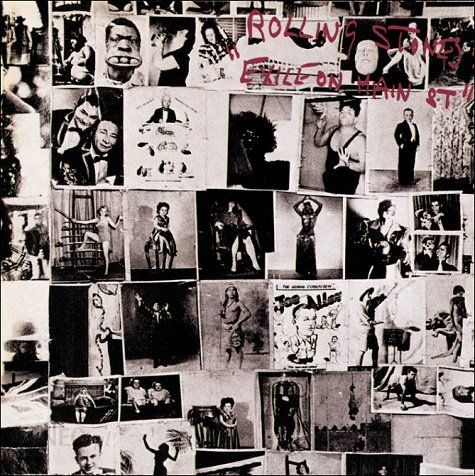Rolling Stones – Exile on Main Street.

For over a year, I was getting down to writing about my favorite rock album. I was collecting materials, I listened to the interviews, I watched the documentary ... I listened to the album itself a hundred times ... As a result, I collected far too much material (you have the opportunity to review the essence of the essence of the squeezed essence). I had doubts if I would be able to reflect his unusual mood and the crazy atmosphere in which he was created. We are talking about "Exile on Main St." Rolling Stones with 1972 year. A record without major "hits" and therefore little known. You really have to listen to the album a couple of times, to feel it. However, this is remarkable, that it is practically impossible to get tired of it. And you still want to come back to it.
It is an album that is highly appreciated by many musicians. Tom Waits said many times, it's one of his favorite albums of all time. As he says: "This record is like a tree of life."
My first broadly understood contact with the Stones was during the summer vacation, when I was fifteen. Then I landed at the camp in a room with my boyfriend, that played nothing else from its boom box, at discos, he pretended the movements of their vocalist, and to a question asked in one of the deeper discussions - "How do you imagine God?”, he replied ... "It's like Mick Jagger more or less." And even him, he never played that record for me. I had to hear "Loving Cup", watching Martin Scorsese's documentary, get interested in the track's origins and ... that's how to discover those sixty-seven minutes of rock / blues from over.
Rock from the abyss
Why over the gulf? The Stones have been convicted of drug possession, and more cases were waiting to begin - Richards and Jagger had already tasted the cell. The band was fresh out of a year's legal battle with Alan Klein for the rights to their songs (the guy argued, that he has the rights to everything they recorded and… everything they record). To make matters worse, the new Labor government has just introduced 93% income tax for people with the highest incomes. As one Stones put it, "If you earn a million pounds and have seventy grand, you know something is wrong ". Richards was careful, that they wanted to make them a scapegoat for "all the evil" in the country - and it was not difficult: Brian Jones just drowned in the pool, at a concert in Altamont their bodyguards (Hells Angels) they stabbed one of the spectators, what ... was captured on the tape, and Keith Richards and his girlfriend, Anita Pallenberg, they were addicted to heroin, and it was a well-known fact. As the famous guitarist says, “It felt, that the government wants to get us out of our homeland. They feared our growing influence and wanted to get us out of their heads. " A decision had been made: we're leaving. Where? The choice fell on France. And so began the exile - the title "Exile".
There are many elements to the hardships of exile. Apart from the obvious, i.e.. the distance of loved ones, the necessity to work in an improvised recording studio, trifles also took their toll. Bill Wyman complained: “I couldn't come to terms with leaving England. I hated it. We had to import English sweets, pickle, and even tea, which, moreover, did not fit French milk at all.” And it's really fun, that is what they mention about the years, and not o “the rest”…
The Stones couldn't find a suitable recording studio in Paris and finally decided to move to Richards's villa in the South of France. They hijacked their recording studio on wheels from Great Britain, they parked them in the driveway of the new premises and went to work. Villa Nellcôte has become their home. And you can be sure, that it was not only their exile that took their toll. The French were also not happy to be visited. As Pallenberg says: “Finally the police got interested in us. Besides, I'm not surprised at all. We looked suspicious and we really played the music, really loud. One time I went to the nearby Villefranche and ... even there you could hear boys playing. It was during the day, and they played almost every night!”
Crazy conditions
It quickly turned out, that it is not the best house possible, and it certainly does not work as a recording studio. First of all, the atmosphere was specific. This building, which the Nazis used during the occupation still bore traces of their tastes. Richards described creating it "like trying to make an album in a Fuhrer's bunker. The atmosphere was very… Germanic there. There were swastikas on the stairs ... It was very nice upstairs, in the style of Versailles. The basement, however, resembled ... "Hell" of Dante. " Not enough, that it was sometimes cruelly hot there - the saxophonist regularly undressed to his pants - , yet the floor plan was hopeless. There were tons of them. As a result, the piano had to stand in the kitchen, drums in the room, guitar in another, bass was in the same, but the amplifiers were already landing in the corridor. The recording studio itself, as I mentioned it was standing in the driveway. Communicating was very complicated - producer Jimmy Miller regularly sprinted from the recording console to the band members and back again, - and in total stuffiness the musicians did not want to start at all. Have I mentioned already, that due to high humidity, the guitars melted out very quickly?
Plus when it seemed, that somehow they got the recording machine up and running, Jagger announced, that he is marrying Bianca Perez Morena de Macias - a model, born in Nicaragua in nearby Saint Tropez. The international press has gone mad, all the great ones came to the seaside resort. Jagger is on a honeymoon trip (short honeymoon), and after returning, the party moved to a villa. Nobody thought about recording.
Where is everybody?
It didn't get any better later either. As Watts said: “Mick was still in Paris, where was Bianca - we couldn't start playing. We worked at random hours. Sometimes we started with Fr. 23:00 and we worked through 12 Hours, sometimes Fr. 10 in the morning and too 12 hours of playing. It made no sense, to commute there, so I live with Keith in this beautiful mess of his. " This is well reflected in the history of the song "Happy". This one of the few songs in the history of the Rolling Stones with Keith's vocal, was recorded in one go, when Richards one morning (or at night) he entered the rehearsal room and, bored with waiting for the rest of the band, started playing with the only ones present (and not asleep ) people: saxophonist Bobby Keys and producer Jimmy Miller. The latter sat behind the drums. In the words of Richards: ”I sang Happy, Cause I came early for the rehearsal once. Only Keys and Miller were sitting there. We weren't supposed to do. At some point, out of boredom, I picked up the guitar and played this riff ... We started recording me playing guitar and the result landed on the album. Later we put on a baritone saxophone, another guitar and Jimmy Miller on drums. We just started playing and at the end of the day we had a song, which everyone liked!”
Bassist Bill Wyman recalls, that during the best times, the team worked every night from eight in the evening to three in the morning. As he says: “Not everyone showed up every night. This was the main source of frustration for me. On our previous two albums we worked well and listened to producer Jimmy Miller. It was different in the villa, and it took a while to figure out why. " And they were quite obvious. Visited by figures such as the famous writer William S.. Burroughs, Terrt Southern or Gram Parsons, Richards pumped thousands of dollars worth of heroin into himself in their company. The last of their guests was kicked out at the beginning of July 1971, fearing a police raid and wanting to rid the villa of drugs. The invasion finally took place. However, only in 1973 year. Richards and Pallenberg were caught in possession of heroin (and its quantity rewarded them not for possession, but for trading). As a result, Richards was barred from France for two years, which translated into no Stones concerts at the time.
The American journalist Robert Greenfield, who lived with them for some time, described the period of the album in his book "Exile on Main St.: A Season in Hell With the Rolling Stones”. According to him, Richards and Pallenberg were forever stoned. The schedule of recordings was dictated solely by the presence and condition of the musicians. Nothing could be planned. The only musicians who did not weigh anything were: Wyman, Watts i Jagger.
He is supported in this by Tommy Weber - a rally driver, who equipped Richards with drugs at the time: “We had some cocaine there, a lot of joints. If you live a decadent life, you will always find some darkness there. However, we spent those days in the state of meadows. That was before darkness came. Sunrise, heralding the later sunset. "
Gorgeous, crazy atmosphere
And in fact, a unique atmosphere had to arise amidst all these tensions and madness. French photographer Dominique Tarle, which immortalized the entire process of creating the album, a long series of great photos, he also remembers this period with great nostalgia: “We were young then and it was a time of great freedom, energy and creativity. For me, It was kind of rock n roll heaven." After Exile on Main St. Richards descended into the abyss of addiction - the recordings of their concerts come from the seventies, in which you can see Keith barely on his feet and wandering around the stage with the wrong expression in his eyes. It was as if he poured all possible substances into himself, he experienced a creative peak and hissed himself out for the next decade. After recording this album, Jagger got the baton back, and the Stones never sounded so sexy again, desperately and sincerely.
And what is the difference between the leadership styles of these two musicians?? Keith Richards clearly describes how he differs from Jagger: “Mick needs to know what he will know tomorrow. As for me, it is enough for me that after waking up I will find out who is around. Seems to, that this one time, the Stones guitarist personality had taken over. The music is rocking and dirty, and the recording process is, to put it mildly: chaos. This is confirmed by Charlie Watts: “Much of the Exile album was made with a Richards approach to working. We've played it twenty times, we let the pieces get marooned, mellow, then we played it again twenty times. Keith knows what she likes, but has a very relaxed approach. He is really a very eccentric character, real bohemia. " Only under his guidance could this story happen: one fall day 1971 year, a group of thieves just entered the villa, through the main gate and carried nine Richards guitars, Keys saxophone and Wyman bass. The villagers were sitting in the living room at that time and watched TV. "Everything was so disorganized there ...", Summarizes Wyman. The theft was allegedly committed by mafia, Richards hung out with to get heroin. It was their method of settling unpaid bills. However, they did not quite know, which criminal group committed the robbery - Richards bought himself from local criminals, with another group from nearby Marseille, and even - apparently - with the Italian mafia.. Greenfield, mentioned earlier, describes how a panicked Richards bought a motorboat (which Mandrax baptized), he carried a gun with him and, together with Pallenberg, developed a complicated quick escape plan in case the Italian mafia wanted to join them.
Keith Richards behind the scenes
This shift in leadership for one album also explains why Jagger dislikes it. He has repeatedly described it as "aimless.", bad sounding ". In addition, he complained about the producer, “Jimmy Miller was not functioning very well at the time. I had to finish recording and editing myself. Apart from me, there were only drunkards and junkies… ”Perhaps it is puzzling, that his vocal - yes, sometimes disappearing in the guitar sound - is probably the most moving and saturated with emotions on this album. How would he not rate this album in the second phase of work on it?, already at Sunset Studios in Los Angeles, he was in charge of everything. He organized keyboardist Billy Preston and Dr. John, a famous singer to support backing vocals. At the last moment, he also added the last lyrics and added vocals. As he says himself, text for the first single Tumling Dice "I wrote when I sat down with our housekeeper and started talking about gambling. I didn't know anything about it myself, but she really loved playing dice. "
How to sum up this album, how to define its wording? Dirty blues, rock from the abyss, sexy, rocking boogies. It's not something you can catch on MTV right now. Good boys don't play it. Besides, a wave of sound, everything blasé and unclean. As Richards said recently: „Exile on Main St. was the first grunge album. " You can feel desperation on the record, joy after all and a lot of power - a team leaning against the wall, pursued, vilified in the media, but believing in their ability to survive everything. Jagger's vocals have never been so emotional, and Richards's guitar didn't sound so lazy. Besides, a harmonica, piano and trumpets. Jim Price and Bobby Keys playing the latter, and keyboardist Nicky Hopkins poured dark on this record, crazy blues like from New Orleans bars. Feel, that locked in a villa, a band detached from the big world, he masterfully worked out each track in the hours of sessions - each element almost organically grew from playing. The Stones couldn't go home, so they kept playing. Pieces like "Tumbling Dice", „Rocks Off” czy „All Down the Line”, they preach the will to survive, a „Shine a Light” czy „Happy”, they preach hope despite everything. Let's add a beautiful blues "Sweet Virginia", „Torn and Frayed”, love "Loving Cup", "Sweet Black Angel" and we already know why this album has to play so often in our apartment. Richards said : “The Stones no longer have a home, hence Exile, exile, but still able to do their job. Whatever they throw at us, we still know how to dodge, improvise, overcome obstacles. Now it's us against the world, so fuck yourself. " - you can feel it in the music, in every note: I prefer fighting and surviving.









